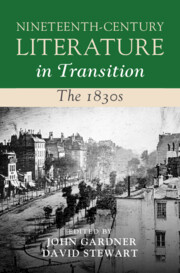Book contents
- Nineteenth-Century Literature in Transition: The 1830s
- Nineteenth-Century Literature in Transition
- Nineteenth-Century Literature in Transition: The 1830s
- Copyright page
- Contents
- Figures
- Contributors
- Acknowledgements
- Introduction
- Chapter 1 On the Eve
- Chapter 2 ‘An Infectious Madness’
- Chapter 3 Augustus Hardin Beaumont, Slavery Apologias, and Popular Radical Literature in the 1830s
- Chapter 4 Patterns of Industry
- Chapter 5 Mother Earth
- Chapter 6 The Polite Fictions of Slavery
- Chapter 7 Suffering, Sentiment, and the Rise of Humanitarian Literature in the 1830s
- Chapter 8 Steam and Iron in the 1830s
- Chapter 9 Lithography and the Comic Image 1825–1840
- Chapter 10 Jorrocks’s Canon
- Chapter 11 Tennyson, Dickens, Poe, Browning, and the Brontës:Blackwood’s Magazine and ‘The Foreheads of a New Generation’
- Chapter 12 Boz in London: The 1830s and the Urban Turn in the English Novel
- Chapter 13 Letitia Elizabeth Landon, Chronicler of the 1830s
- Chapter 14 Railway Imaginary in the 1830s
- Chapter 15 The Emerging Language of Photography
- Afterword
- Index
Chapter 7 - Suffering, Sentiment, and the Rise of Humanitarian Literature in the 1830s
Published online by Cambridge University Press: 30 May 2024
- Nineteenth-Century Literature in Transition: The 1830s
- Nineteenth-Century Literature in Transition
- Nineteenth-Century Literature in Transition: The 1830s
- Copyright page
- Contents
- Figures
- Contributors
- Acknowledgements
- Introduction
- Chapter 1 On the Eve
- Chapter 2 ‘An Infectious Madness’
- Chapter 3 Augustus Hardin Beaumont, Slavery Apologias, and Popular Radical Literature in the 1830s
- Chapter 4 Patterns of Industry
- Chapter 5 Mother Earth
- Chapter 6 The Polite Fictions of Slavery
- Chapter 7 Suffering, Sentiment, and the Rise of Humanitarian Literature in the 1830s
- Chapter 8 Steam and Iron in the 1830s
- Chapter 9 Lithography and the Comic Image 1825–1840
- Chapter 10 Jorrocks’s Canon
- Chapter 11 Tennyson, Dickens, Poe, Browning, and the Brontës:Blackwood’s Magazine and ‘The Foreheads of a New Generation’
- Chapter 12 Boz in London: The 1830s and the Urban Turn in the English Novel
- Chapter 13 Letitia Elizabeth Landon, Chronicler of the 1830s
- Chapter 14 Railway Imaginary in the 1830s
- Chapter 15 The Emerging Language of Photography
- Afterword
- Index
Summary
This chapter focusses on the rise of humanitarian literature relating to the southern hemisphere settler colonies of Australia, New Zealand, and South Africa in the 1830s, when humanitarian concerns about the treatment of Indigenous peoples coincided with the abolition of chattel slavery and the proliferation of coerced and indentured labour. It examines how travel writing and poetry of witness encouraged humanitarian intervention on colonial frontiers, often by ventriloquising the voices of Indigenous peoples in the aftermath of violent massacres. It considers the wider networks and print media in which humanitarian literatures originated, such as open letters, religious tracts, treaties, and petitions. The chapter argues for the importance of a sentimentalised aesthetics of eyewitness immediatism drawn from abolitionist literature in shaping (and distorting) attitudes towards Indigenous peoples. It considers what the framework of humanitarianism can tell us about the literary culture of the 1830s and about the period’s cultural politics of emotion, as metropolitan social commentators sought to redirect sympathetic norms away from distant suffering and towards white poverty at home.
- Type
- Chapter
- Information
- Nineteenth-Century Literature in Transition: The 1830s , pp. 147 - 169Publisher: Cambridge University PressPrint publication year: 2024



